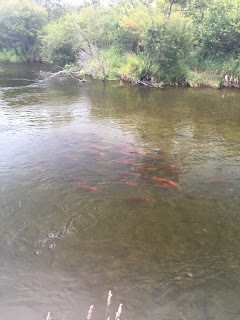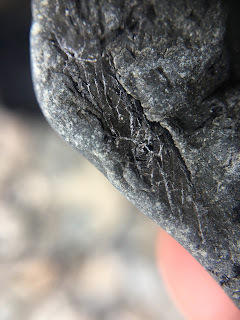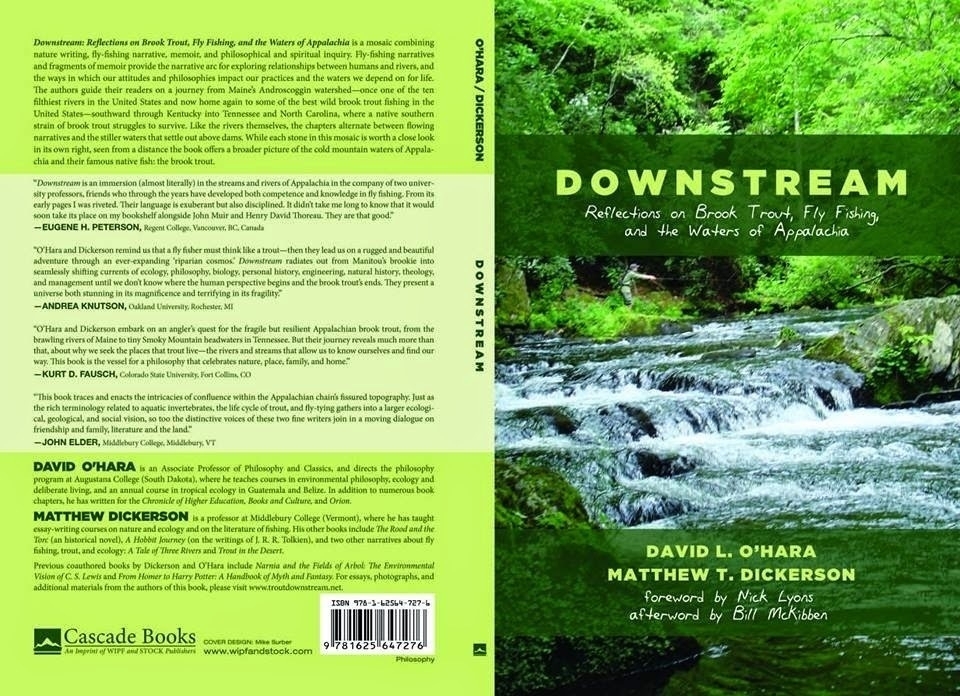Kurt Fausch
∞
The Trace I Left Behind
This summer I spent several weeks in and around Lake Clark National Park doing research on trout, salmon, and char.
Sometimes I get quizzical looks when I say that I, a philosophy and classics professor, am researching fish. Let me explain.
I teach environmental philosophy and a range of classes in what I call "environmental humanities." These include courses in environmental ethics, nature writing, philosophy of nature, and even a course on environmental law and policy for first-year undergraduates, as an introduction to being a university student.
I also teach courses in field ecology, including a monthlong course in tropical ecology in Guatemala and Belize. I teach in Greece over my spring break, and this year we will be looking at the expansion of fish farms in the Mediterranean and how fishing has changed there over the last six thousand years.
Closer to home, I teach and practice what Norwegians call friluftsliv, or life in the free air. Whenever possible, I teach outdoors. Most years, I take my ancient philosophy students camping in the Badlands National Park to watch the Orionid meteor shower while we lie on sleeping bags under the stars.
In all of this, my aim is to make sure that nature is not an abstraction to my students, nor to me. I want to know the places the fish live, the grasslands the bison roam, the forests where the jaguar and the ocelot hunt, the tundra rivers where the Dolly Varden chase the salmon under the watchful gaze of the bears.
In other words, my aim is to stay in contact with wildness, and to do so in a way that allows me to take something valuable home: intimate knowledge. I am not a scientist, so I don't bring samples back to a laboratory. I do bring home photographs, and I do spend a lot of time making observations of the places I work, so that I can bring home notebooks full of writing to share with my students. And of course, I write books and articles to share with others.
This summer, I was sorely tempted to bring something else home from Lake Clark: a tiny fossil. I had chartered a float plane to take me to a fairly remote lake, and there my fellow researchers and I walked the shore to the mouth of a stream full of spawning salmon and rainbow trout.
As I often do, I sat down on the gravel and started to turn over rocks to see what invertebrates were living there. The salmon are bright red and eye-catching, but the bugs and spiders tell an important part of the story of a place, as Kurt Fausch has written about in his recent book, For The Love Of Rivers. Who was it - J.B.S. Haldane, perhaps? - who quipped that God has "an inordinate fondness for beetles." The world is full of wonderful, tiny lives that are easy to overlook.
I don't try to bring beetles home, but one insect tempted me this summer. Really, it was just a trace of an insect, just the trace of its wings, in fact. I can't even tell you what insect it was. All I can tell you is that somewhere near that river, probably millions of years ago, something like a dragonfly died in the mud, and the river graced its delicate wings with the cerement of silt. That silt took the form of the wings, those wings left a fingerprint - a wingprint - on the earth. And this summer, I found that print, that delicate, wonderful trace.
While my son and my friend and our pilot walked, I sat with that stone in my hand and thought about pocketing it. Here I was in the wilderness, and no one would know. It's one tiny stone in the largest state in the union; who would miss it?
Ah, but it is one tiny stone that does not belong to me. It is one tiny stone in a vast wilderness that belongs to all of us, and to all who will come after us. It is one tiny piece of rock with an incomplete fossil of a little odonata. The river there has held it and cared for it since time immemorial.
Now I am back in South Dakota, but a tiny trace of my heart remains along the strand of that stream in Alaska. It lies there, wrapped around that delicate trace of insect wing, and I will never find it again in that vast wilderness.
But perhaps someone else will. Until then, perhaps it is best not to let Midas' longings turn our hearts to stone too soon. Let's walk the shores together, I will continue to say to my students. And let's bring something intangible home in our memories. And let's do the hard work of leaving behind the beautiful, delicate traces that wildness has safeguarded for so many, many years.
Sometimes I get quizzical looks when I say that I, a philosophy and classics professor, am researching fish. Let me explain.
I teach environmental philosophy and a range of classes in what I call "environmental humanities." These include courses in environmental ethics, nature writing, philosophy of nature, and even a course on environmental law and policy for first-year undergraduates, as an introduction to being a university student.
I also teach courses in field ecology, including a monthlong course in tropical ecology in Guatemala and Belize. I teach in Greece over my spring break, and this year we will be looking at the expansion of fish farms in the Mediterranean and how fishing has changed there over the last six thousand years.
Closer to home, I teach and practice what Norwegians call friluftsliv, or life in the free air. Whenever possible, I teach outdoors. Most years, I take my ancient philosophy students camping in the Badlands National Park to watch the Orionid meteor shower while we lie on sleeping bags under the stars.
In all of this, my aim is to make sure that nature is not an abstraction to my students, nor to me. I want to know the places the fish live, the grasslands the bison roam, the forests where the jaguar and the ocelot hunt, the tundra rivers where the Dolly Varden chase the salmon under the watchful gaze of the bears.
In other words, my aim is to stay in contact with wildness, and to do so in a way that allows me to take something valuable home: intimate knowledge. I am not a scientist, so I don't bring samples back to a laboratory. I do bring home photographs, and I do spend a lot of time making observations of the places I work, so that I can bring home notebooks full of writing to share with my students. And of course, I write books and articles to share with others.
This summer, I was sorely tempted to bring something else home from Lake Clark: a tiny fossil. I had chartered a float plane to take me to a fairly remote lake, and there my fellow researchers and I walked the shore to the mouth of a stream full of spawning salmon and rainbow trout.
 |
| Salmon preparing to spawn |
As I often do, I sat down on the gravel and started to turn over rocks to see what invertebrates were living there. The salmon are bright red and eye-catching, but the bugs and spiders tell an important part of the story of a place, as Kurt Fausch has written about in his recent book, For The Love Of Rivers. Who was it - J.B.S. Haldane, perhaps? - who quipped that God has "an inordinate fondness for beetles." The world is full of wonderful, tiny lives that are easy to overlook.
I don't try to bring beetles home, but one insect tempted me this summer. Really, it was just a trace of an insect, just the trace of its wings, in fact. I can't even tell you what insect it was. All I can tell you is that somewhere near that river, probably millions of years ago, something like a dragonfly died in the mud, and the river graced its delicate wings with the cerement of silt. That silt took the form of the wings, those wings left a fingerprint - a wingprint - on the earth. And this summer, I found that print, that delicate, wonderful trace.
 |
| Fossilized trace of an insect's wing |
While my son and my friend and our pilot walked, I sat with that stone in my hand and thought about pocketing it. Here I was in the wilderness, and no one would know. It's one tiny stone in the largest state in the union; who would miss it?
Ah, but it is one tiny stone that does not belong to me. It is one tiny stone in a vast wilderness that belongs to all of us, and to all who will come after us. It is one tiny piece of rock with an incomplete fossil of a little odonata. The river there has held it and cared for it since time immemorial.
Now I am back in South Dakota, but a tiny trace of my heart remains along the strand of that stream in Alaska. It lies there, wrapped around that delicate trace of insect wing, and I will never find it again in that vast wilderness.
But perhaps someone else will. Until then, perhaps it is best not to let Midas' longings turn our hearts to stone too soon. Let's walk the shores together, I will continue to say to my students. And let's bring something intangible home in our memories. And let's do the hard work of leaving behind the beautiful, delicate traces that wildness has safeguarded for so many, many years.
∞
Professors of Trout
In the course of writing Downstream (my book on brook trout) I did a lot of research about trout and fly-fishing. Thankfully, it turns out I'm not the only academic interested in brook trout and fly rods. Far from it!
Really, this shouldn't be too surprising. Fly-fishing requires us to look attentively, seeing past the surface of the water in order to discern what is happening deeper down. Far more than simply catching fish, fly-fishing is a practice of reading water as though it were a natural text.
Several authors, professors, and fellow-thinkers have been helping me to deepen my literacy in these streams of thought lately. Among them are Kurt Fausch, Douglas Thompson, and David Suchoff.
Fausch is one of the world's authorities on trout biology and ecology. I had the privilege of reading a draft of Fausch's forthcoming book, For The Love Of Rivers, (see the book trailer here) and I highly recommend it. It is a lovely marriage of science and lyrical writing. You'll learn a lot about the life of rivers, written by a remarkable writer who loves them deeply.
Thompson's book, The Quest For The Golden Trout is next on my to-read list, but I've already snuck some glimpses at it and I am eager to get to it. I'll post more about it when I'm done. Meanwhile, check out his webpage.
I discovered Suchoff recently when I saw one of his students fly-fishing for bonefish in Belize. I teach a January-term field ecology course for Augustana College in Guatemala and Belize. One morning I looked out over the intertidal flat and saw a young woman casting a heavy fly in turtle grass on South Water Caye. I ran into her later on shore and she told me about a terrific class Suchoff teaches at Colby College in Maine. He teaches them the literature of fly-fishing, arranges professional instruction, then takes his students fishing in California, and teaches them to write about it. You can find him on Twitter, too.
One of the joys of research is that it gives me the excuse to write to strangers who share my interests and ask them to teach me what they know. My acquaintance with two of these professors is quite new, but already I've learned from them. The third, Fausch, I've known for long enough that he reviewed a draft of my book and kindly pointed out a few errors before I made them permanent in print.
These are, as I've said, just a few of the university professors who study trout. Are you another? I'd love to hear from you if so.
Really, this shouldn't be too surprising. Fly-fishing requires us to look attentively, seeing past the surface of the water in order to discern what is happening deeper down. Far more than simply catching fish, fly-fishing is a practice of reading water as though it were a natural text.
Several authors, professors, and fellow-thinkers have been helping me to deepen my literacy in these streams of thought lately. Among them are Kurt Fausch, Douglas Thompson, and David Suchoff.
Fausch is one of the world's authorities on trout biology and ecology. I had the privilege of reading a draft of Fausch's forthcoming book, For The Love Of Rivers, (see the book trailer here) and I highly recommend it. It is a lovely marriage of science and lyrical writing. You'll learn a lot about the life of rivers, written by a remarkable writer who loves them deeply.
Thompson's book, The Quest For The Golden Trout is next on my to-read list, but I've already snuck some glimpses at it and I am eager to get to it. I'll post more about it when I'm done. Meanwhile, check out his webpage.
I discovered Suchoff recently when I saw one of his students fly-fishing for bonefish in Belize. I teach a January-term field ecology course for Augustana College in Guatemala and Belize. One morning I looked out over the intertidal flat and saw a young woman casting a heavy fly in turtle grass on South Water Caye. I ran into her later on shore and she told me about a terrific class Suchoff teaches at Colby College in Maine. He teaches them the literature of fly-fishing, arranges professional instruction, then takes his students fishing in California, and teaches them to write about it. You can find him on Twitter, too.
One of the joys of research is that it gives me the excuse to write to strangers who share my interests and ask them to teach me what they know. My acquaintance with two of these professors is quite new, but already I've learned from them. The third, Fausch, I've known for long enough that he reviewed a draft of my book and kindly pointed out a few errors before I made them permanent in print.
These are, as I've said, just a few of the university professors who study trout. Are you another? I'd love to hear from you if so.
∞
Downstream: My New Book On Brook Trout and Appalachian Ecology
You can find it here, on the publisher's website, for a very reasonable price.
It is now listed on Amazon as well, though not yet in stock there.
I'm very grateful for the foreword by Nick Lyons, the afterword by Bill McKibben, and the kind words offered by such a wide range of brilliant scholars of theology, literature, and science, like Eugene Peterson, Andrea Knutson, Kurt Fausch, and John Elder.
It is now listed on Amazon as well, though not yet in stock there.
I'm very grateful for the foreword by Nick Lyons, the afterword by Bill McKibben, and the kind words offered by such a wide range of brilliant scholars of theology, literature, and science, like Eugene Peterson, Andrea Knutson, Kurt Fausch, and John Elder.
